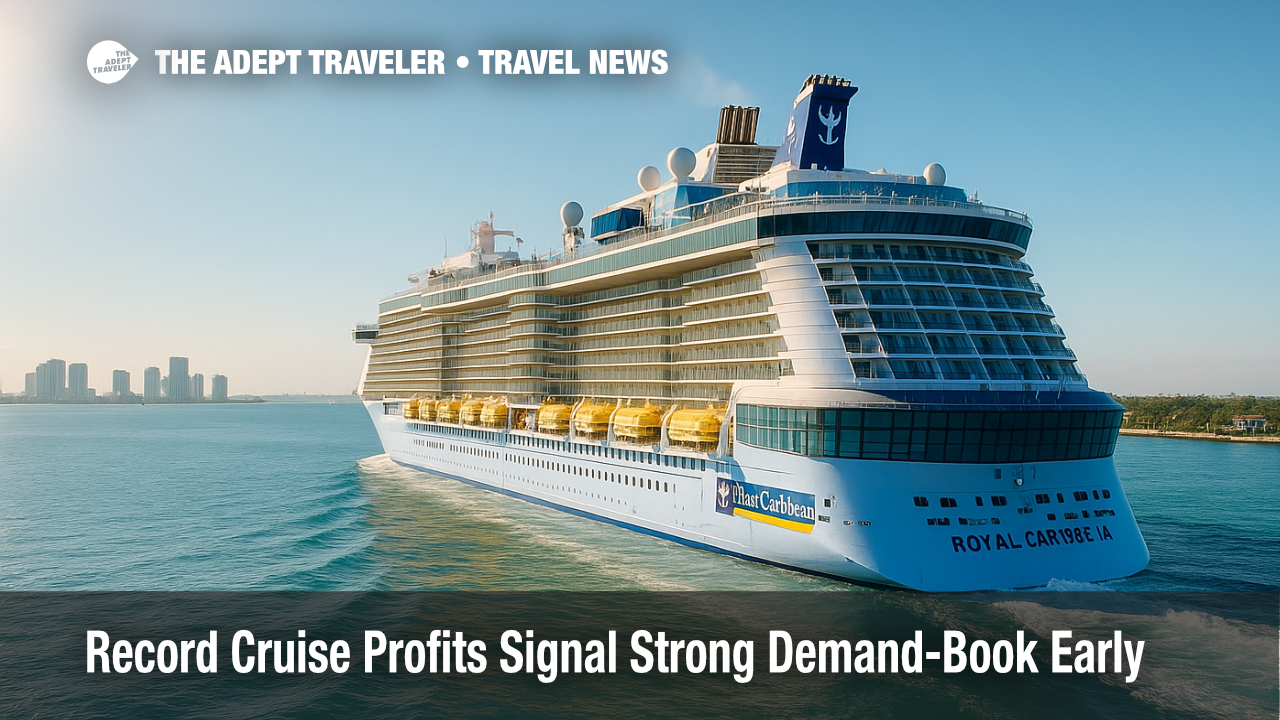Record Cruise Profits Signal Strong Demand-Book Early

Robust second-quarter earnings from leading cruise lines underscore an unprecedented surge in cruise demand. As Carnival Corporation, Royal Caribbean Group, and Norwegian Cruise Line Holdings post record revenues and accelerated bookings, capacity for late 2025 and much of 2026 is filling faster-and at higher prices-than ever recorded. For travelers, that means the cheapest cabins and most popular itineraries are disappearing months earlier than in pre-pandemic years. Experts warn that waiting for "last-minute deals" could now mean settling for wait-lists or premium fares. Early cruise booking is no longer savvy; it is essential.
Key Points
- Why it matters: Record profits confirm cruise demand is outpacing new capacity.
- Carnival hit an all-time high $6.3 billion quarterly revenue and $8.5 billion deposits.
- Royal Caribbean boosted full-year EPS guidance to up to $15.55 on 110 % load factors.
- Norwegian's bookings now surpass historical levels despite higher pricing.
- Analysts expect berth shortages on marquee sailings through mid-2026.
Snapshot
Cruise demand has rebounded with startling vigor since 2023, propelling a new "book-early or bust" marketplace. Load factors exceeded 100 % across the big three cruise groups last quarter, while net yields rose between 2.7 % and 6.4 %. At the same time, orderbooks for new ships remain at pre-pandemic cadence, creating supply tension. The result: early cruise booking windows have stretched to 12-18 months for peak-season voyages, and Caribbean mega-ships are now regularly sold out a year ahead. Travelers seeking choice in cabin category or dining times need to lock itineraries far sooner than before-especially if they want introductory fares or perks.
Background
Before the 2020 shutdown, cruise lines routinely dangled last-minute discounts to keep occupancies above 100 %. Pandemic-era credits, pent-up leisure demand, and significant onboard spending growth have since rewritten that playbook. Carnival's customer deposits set a new record this quarter, while Royal Caribbean's direct digital channels captured a double-digit share of bookings. Norwegian's brands report passengers spending more on beverage packages, specialty dining, and shore excursions-reinforcing higher ticket pricing. Meanwhile, supply growth remains modest; global fleet capacity is projected to expand just 6 % annually through 2027, well below current demand growth, cementing the early-booking imperative.
Latest Developments
Carnival's record quarter tightens inventory
Carnival Corporation delivered $6.3 billion in Q2 revenue-its highest ever-while net income jumped by nearly $475 million year-over-year. Executives cited "the furthest booking curve on record," with 2026 reservations already matching 2025's record pace. Average fares rose 6.4 % in constant currency, yet occupancy remained the second-highest in company history. Customer deposits climbed to $8.5 billion, signaling travelers are willing to commit cash much earlier. Management warned that while new flagship Celebration Key opens next year, capacity constraints will persist through mid-2027, making early deposits the only reliable hedge against price hikes.
Royal Caribbean lifts outlook on 110 % load factors
Royal Caribbean Group's second-quarter net income soared to $1.2 billion, or $4.41 per share, prompting a full-year EPS upgrade to as high as $15.55. Net yields grew 5.2 % in constant currency, propelled by stronger close-in demand and record onboard spending. Booked load factors for 2025 and 2026 already sit "at higher rates" than historic norms, according to CEO Jason Liberty. Early demand for forthcoming vessels-Star of the Seas and Celebrity Xcel-is "very robust," with suites selling out within days of season launches. Analysts note that traditional "wave season" bargains are now virtually nonexistent for the brand's Caribbean and Alaska programs.
Norwegian's rebound driven by forward bookings
Norwegian Cruise Line Holdings reported record Q2 revenue of $2.5 billion and reiterated full-year guidance after surpassing all key metrics. Bookings across Norwegian, Oceania, and Regent Seven Seas now lead historical levels despite a 2.7 % ticket-price increase. President and CEO Harry Sommer highlighted a booking curve extending beyond 18 months for luxury Regent voyages and longer-haul Oceania itineraries. The company's planned enhancements to Great Stirrup Cay and its new luxury ship Oceania Allura have already generated premium-priced pre-sales. Financial analysts say Norwegian's recovery trajectory confirms broad-based demand, reducing the likelihood of widespread discounting.
Analysis
A confluence of factors-pent-up demand, generational wealth transfers, and flexible remote-work policies-has fueled what some insiders call the "golden cycle" for cruising. Onboard spending growth outpacing fare increases gives cruise lines margin room, allowing them to maintain higher pricing without sacrificing guest satisfaction. At the same time, industry-wide sustainability upgrades and a wave of mega-resort private islands are drawing first-time cruisers who previously favored all-inclusive resorts. The current capacity pipeline cannot absorb demand quickly: even with roughly 50 ships on order through 2028, berth supply lags projected passenger growth. Consequently, cruise line profits should remain elevated, reinforcing revenue-management strategies that reward early commitments and penalize procrastination. For travelers, that means fewer fire-sale cabins and more dynamic pricing algorithms similar to airlines. Travel advisors now recommend depositing at least 15 months ahead for peak-season voyages, especially if aiming for balcony cabins or new-build ships. Waiting could leave travelers choosing inside cabins at premium fares-or sitting out entirely.
Final Thoughts
The era of speculative, last-minute cruise shopping is fading fast. Record cruise line profits show that strong cruise demand is here to stay, and capacity additions will not catch up for several years. Travelers who value choice, favorable pricing, and perks must pivot to early cruise booking strategies-ideally a year or more in advance-to avoid disappointment and inflated costs. Until supply growth overtakes demand, booking early is the smartest path to securing the perfect itinerary in today's high-stakes cruise market driven by unrelenting cruise demand.
Sources
- Carnival tops guidance achieving highest-ever second quarter operating results - Carnival Corporation & plc
- Royal Caribbean Group reports second quarter results and increases full-year guidance - Royal Caribbean
- Norwegian Cruise Line Holdings reports second quarter 2025 financial results - Norwegian Cruise Line Holdings
